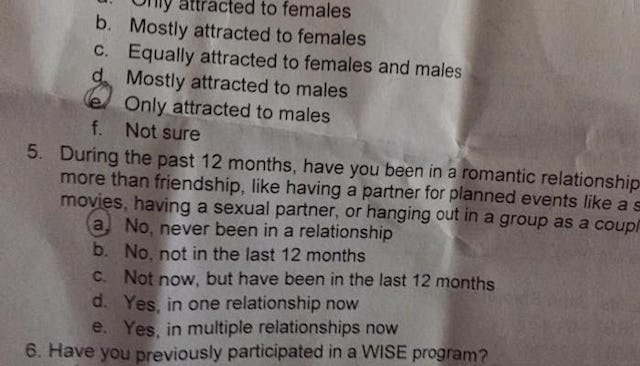School Gives Survey About Sexual History And Gender Identity To 5th Graders

Mom shares survey about sexual history given to her fifth grade daughter at school
Vanessa Beach took to Facebook last week to share her outrage and confusion over a questionnaire given to her 10-year-old daughter at school. The girl, in fifth grade, put the survey in her pocket and brought it home to show her mom instead of handing it in — because even a child knows this is not at all OK.
Beach writes, “Zoe did a survey at school today and I am reading it and see this… now I don’t think sexuality is a dirty thing don’t get me wrong and by that I mean ANY sexuality i am pro do you 100%. that being said I am honestly a little taken back that the schools thinks it’s ok to ask my child about her and her peers sexuality at the age of ten.”
And she has every right to be upset. When my daughter was in fifth grade, before her school did “the talk” with kids, we got a long letter home that ended in a permission slip. Of course, I wanted her to get the information, but appreciated the heads’ up and the chance to have a say in what my child learns about sex. Beach didn’t have that opportunity — and she’s rightfully livid.
“What if my child was having a hard time with her sexuality?? What if any child in that class were!! Do you really feel like it’s your jobs to make them put an answer on paper for others to read!!?” she writes.
The questions include asking kids if they’re attracted to females, males, or both — and to what degree. It also asks kids about their love lives. In fifth grade.
“Have you been in a romantic relationship?” it reads. “By relationship, we mean more than friends, like having a partner for planned events, like a school dance, going to the movies, or having a sexual partner.”
Which is just…wow. It’s hard to find words for how totally inappropriate this is for a fifth grade student.
“I spoke with the school and the first person was the guidance counselor who told me she herself had reservations about the survey and several teachers also expressed concern. That bothered me a lot,” Beach tells Scary Mommy.
“The superintendent said he was sorry and had he or the principal seen it it wouldn’t have gone out to students in class,” she shares. “Also concerning is the ‘opt out’ form that was sent home (that many parents say they did not receive), but basically you have to sign and return if you do not want your child included, so if they never saw it again your child was included.” Beach says she never received the form.
The questionnaire was developed and distributed by WISE, a group that advocates against gender-based violence. Jane Stapleton is the co-director of the Prevention Innovations Research Center at the University of New Hampshire, which worked with WISE and the Institutional Review Board in developing the survey questions. She tells Yahoo Lifestyle that Beach not objecting to her child answering the questions was considered “passive consent,” which is in compliance with state law when it comes to non-academic surveys distributed to kids in school. Beach tells Scary Mommy that the principal was supposed to approve of the survey before it went to students, which didn’t happen.
Beach says she found out after the fact that the form stated the survey was about domestic violence and suicide prevention, which she says she would’ve signed off on. Beach “loves” the school, but feels they “dropped the ball” with allowing this survey — and that she’s concerned they’re prioritizing their relationship with WISE above the well-being of the students. Until she feels that the students’ best interests are the number one concern, Beach plans to continue advocating for her daughter and her peers.
“The point of this survey was to follow my daughter and her peers throughout high school collecting data on their sexuality and relationships — for the next six years,” she says. Beach questions whether parents even have the right to give consent for their children to answer such personal questions until they finish high school.
Beach’s story is an excellent reminder that parents always need to advocate for their kids — and to speak up when something doesn’t feel right.